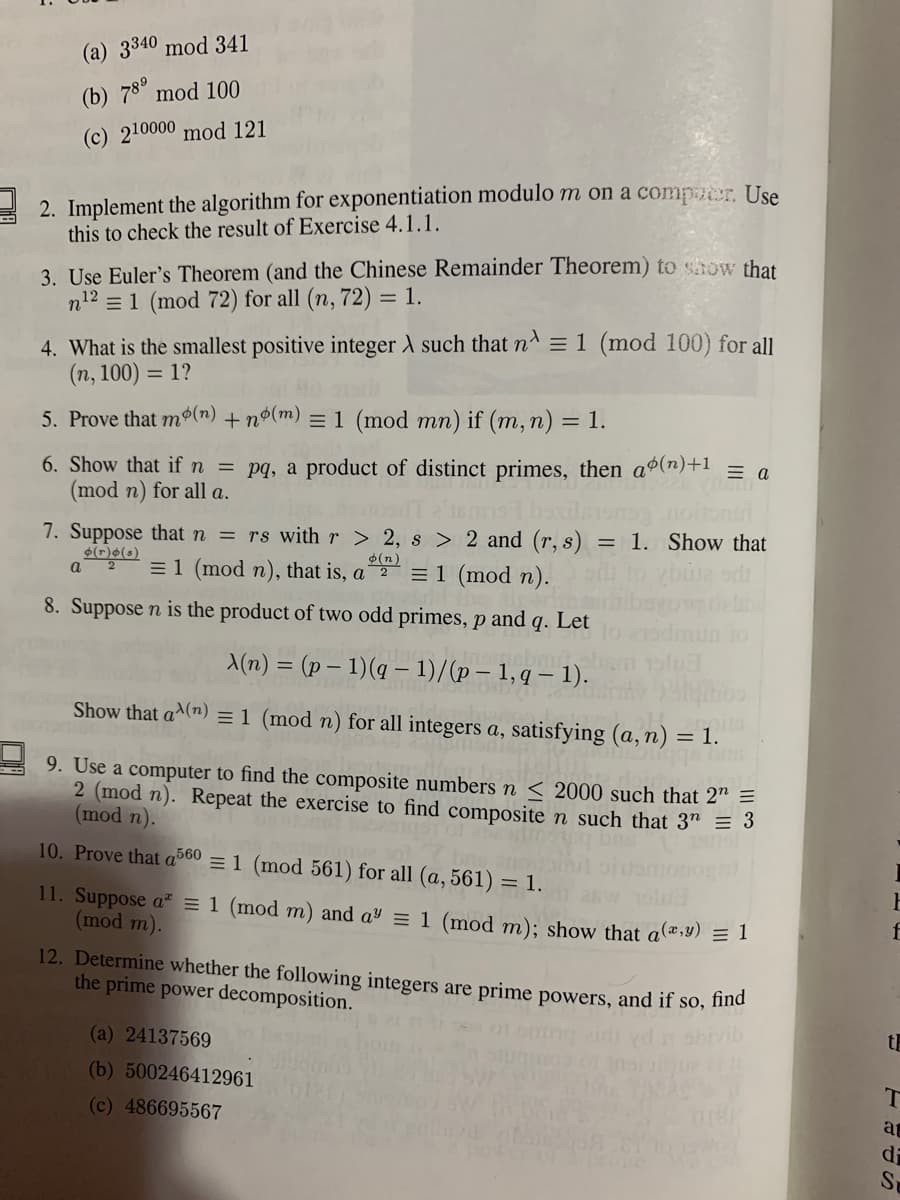3. Use Euler's Theorem (and the Chinese Remainder Theorem) to how that n12 = 1 (mod 72) for all (n, 72) = 1. %3D
3. Use Euler's Theorem (and the Chinese Remainder Theorem) to how that n12 = 1 (mod 72) for all (n, 72) = 1. %3D
Elements Of Modern Algebra
8th Edition
ISBN:9781285463230
Author:Gilbert, Linda, Jimmie
Publisher:Gilbert, Linda, Jimmie
Chapter2: The Integers
Section2.3: Divisibility
Problem 49E: 49. a. The binomial coefficients are defined in Exercise of Section. Use
induction on to prove...
Related questions
Concept explainers
Contingency Table
A contingency table can be defined as the visual representation of the relationship between two or more categorical variables that can be evaluated and registered. It is a categorical version of the scatterplot, which is used to investigate the linear relationship between two variables. A contingency table is indeed a type of frequency distribution table that displays two variables at the same time.
Binomial Distribution
Binomial is an algebraic expression of the sum or the difference of two terms. Before knowing about binomial distribution, we must know about the binomial theorem.
Topic Video
Question
Can you do #3?

Transcribed Image Text:(a) 3340 mod 341
(b) 78° mod 100
(c) 210000 mod 121
2. Implement the algorithm for exponentiation modulo m on a compaer Use
this to check the result of Exercise 4.1.1.
3. Use Euler's Theorem (and the Chinese Remainder Theorem) to show that
n12 = 1 (mod 72) for all (n, 72) = 1.
4. What is the smallest positive integer such that n^ = 1 (mod 100) for all
(n, 100) = 1?
5. Prove that m$(n) + n®(m) = 1 (mod mn) if (m, n) = 1.
6. Show that ifn = pq, a product of distinct primes, then a(n)+1
(mod n) for all a.
= a
noionot
1. Show that
7. Suppose that n = rs withr > 2, s > 2 and (r, s)
$(r)¢(s)
a
$(n)
=1 (mod n), that is, a2 = 1 (mod n).
8. Suppose n is the product of two odd primes, p and q. Let
nun o
A(n) %3D (р - 1) (q —1)/(p — 1,9 - 1).
Show that a^(n) =1 (mod n) for all integers a, satisfying (a, n) = 1.
9. Use a computer to find the composite numbers n < 2000 such that 2" =
2 (mod n). Repeat the exercise to find composite n such that 3" = 3
(mod n).
10. Prove that a560 = 1 (mod 561) for all (a, 561) = 1.
11. Suppose a" = 1 (mod m) and aº = 1 (mod m); show that a(ª,y) = 1
(mod m).
f
12. Determine whether the following integers are prime powers, and if so, me
the prime power decomposition.
(a) 24137569
(b) 500246412961
ivib
(c) 486695567
at
Expert Solution
This question has been solved!
Explore an expertly crafted, step-by-step solution for a thorough understanding of key concepts.
Step by step
Solved in 3 steps with 31 images

Knowledge Booster
Learn more about
Need a deep-dive on the concept behind this application? Look no further. Learn more about this topic, advanced-math and related others by exploring similar questions and additional content below.Recommended textbooks for you

Elements Of Modern Algebra
Algebra
ISBN:
9781285463230
Author:
Gilbert, Linda, Jimmie
Publisher:
Cengage Learning,


Elements Of Modern Algebra
Algebra
ISBN:
9781285463230
Author:
Gilbert, Linda, Jimmie
Publisher:
Cengage Learning,
